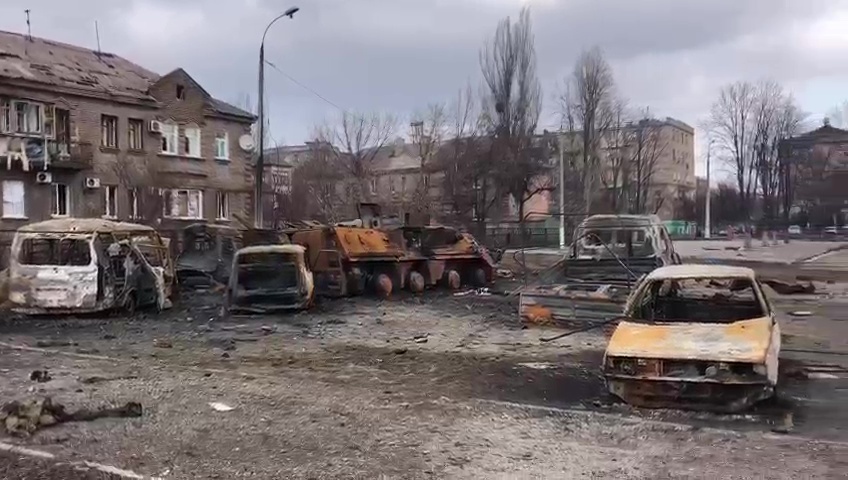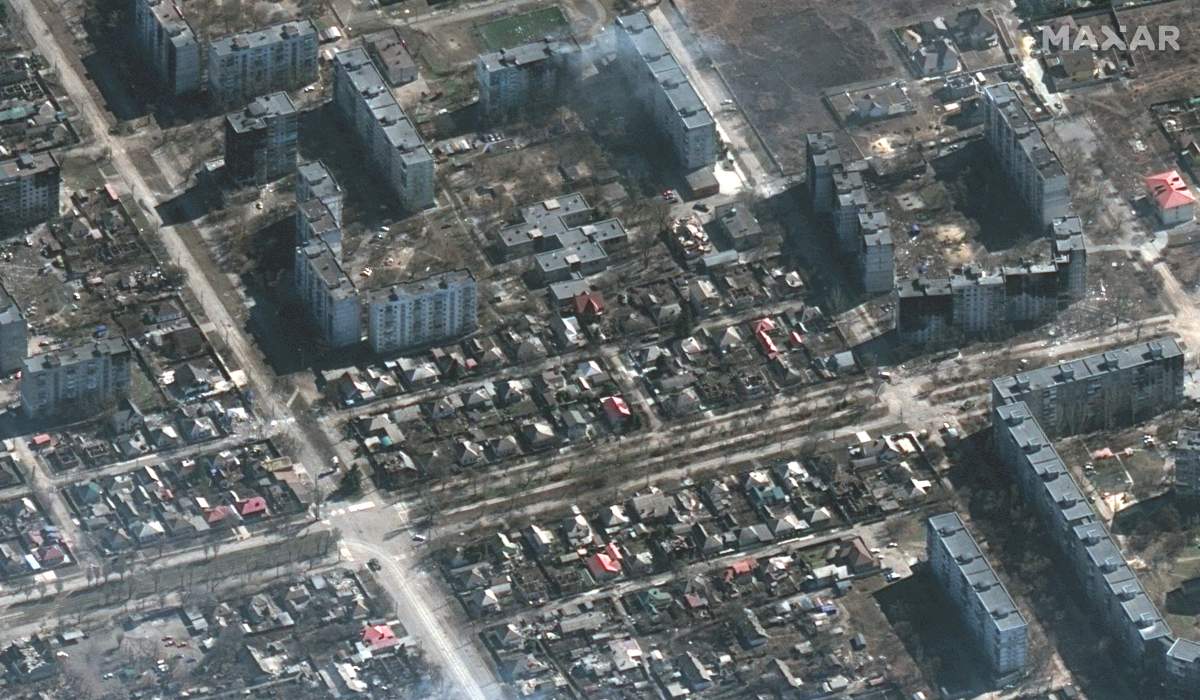Intense Russian air strikes hit the besieged Ukrainian port city of Mariupol and street fighting raged on Tuesday, a day after it rejected Moscow’s demand to surrender, Ukrainian officials said.

The city council said the bombardments were turning Mariupol into the “ashes of a dead land.”
Russia’s RIA news agency said Russian forces and units of Russian-backed separatists had taken about half of the city, citing a separatist leader.
The governor of Donetsk region, Pavlo Kyrylenko, said street fighting was taking place there and civilians as well as Ukrainian troops were coming under Russian fire.
On the 27th day of war in Ukraine, the plight of civilians in Mariupol, normally home to 400,000 people, grew ever more desperate. Hundreds of thousands are believed to be trapped inside buildings, with no access to food, water, power or heat.
“There is nothing left there,” Ukrainian President Volodymyr Zelenskiy said in a video address to Italy’s parliament.
Deputy Mayor Sergei Orlov told CNN the city was under a full blockade and had received no humanitarian aid.
“The city is under continuous bombing, from 50 bombs to 100 bombs Russian aircraft drops each day… A lot of death, a lot of crying, a lot of awful war crimes,” Orlov said.

Mariupol has become the focus of the war that erupted on Feb. 24 when Russian President Vladimir Putin sent his troops over the border on what he calls a “special military operation” to demilitarize Ukraine and replace its pro-Western leadership.
It lies on the Sea of Azov and its capture would allow Russia to link areas in the east held by pro-Russian separatists with the Crimean peninsula, annexed by Moscow in 2014.
Having failed to seize the capital Kyiv or any other major city with a swift offensive, Russian forces are waging a war of attrition that has reduced some urban areas to rubble and taken a huge civilian toll.

Get breaking National news
The United Nations human rights office in Geneva said on Tuesday it had recorded 953 civilian deaths and 1,557 injured since the invasion. The Kremlin denies targeting civilians.
Western officials said on Tuesday Russian forces were stalled around Kyiv but making some progress in the south and east. Ukrainian fighters are repelling Russian troops in some places but cannot roll them back, they said.
However, Kremlin spokesman Dmitry Peskov said “no one” had ever thought the operation in Ukraine would take just a couple of days and the campaign was going to plan, TASS news agency reported.
Western nations were gearing up to impose further sanctions on Russia to force it to reconsider its actions. They will also tighten existing measures, increasing Russia’s isolation from international trade and finance.
U.S. President Joe Biden will join other Western leaders for talks on Thursday in Brussels, where NATO and the European Union are based. Then he plans to travel to Poland, which has taken in some 2.1 million refugees from neighboring Ukraine.

U.S. national security adviser Jake Sullivan said Biden would announce measures to reduce Europe’s dependency on Russian gas – a major hurdle to the West’s efforts to isolate Moscow economically.
The leaders will also coordinate on the next phase of military assistance to Ukraine, Sullivan said.
Mariupol reduced to wasteland
A Reuters team that reached a Russian-seized part of Mariupol on Sunday described a wasteland of charred apartment blocks and bodies wrapped in blankets lying by a road. Read full story
Ukraine says Russian shells, bombs and missiles have struck a theater, an art school and other public buildings, burying hundreds of women and children sheltering in cellars.
Deputy Prime Minister Iryna Vereshchuk, speaking on Ukrainian television on Tuesday, demanded the opening of a humanitarian corridor for civilians. She said at least 100,000 people wanted to leave Mariupol but could not.
Referring to Russia’s earlier demand that the city surrender by dawn on Monday, Vereshchuk said: “Our military are defending Mariupol heroically. We did not accept the ultimatum. They offered capitulation under a white flag.”
Kyiv accused Moscow of deporting residents of Mariupol and separatist-held areas of Ukraine to Russia. This includes the “forcible transfer” of 2,389 children to Russia from the Luhansk and Donetsk regions, Prosecutor General Iryna Venediktova said.
Moscow denies forcing people to leave, saying it is taking in refugees.
Ukraine also accused Russia of blocking humanitarian access to Kherson, which lies northwest of Crimea and is the only provincial capital it has captured. The Foreign Ministry said Kherson’s 300,000 residents were running out of food.
The conflict has so far displaced nearly a quarter of Ukraine’s 44 million people, including some 3.5 million – half of them children – who have fled abroad.

Mourning Holocaust survivor
In his speech to Italian lawmakers, Zelenskiy said the war would bring famine to other countries. Ukraine is one of the world’s biggest grain exporters and the war has caused global prices for staple foods to surge to record levels.
“How can we sow (crops) under the strikes of Russian artillery?” he said. Read full story
In an address overnight, Zelenskiy also drew attention to the death of Boris Romanchenko, 96, who survived three Nazi concentration camps during World War Two but was killed when his apartment block in besieged Kharkiv was shelled last week.
In killing Romanchenko, “Putin managed to ‘accomplish’ what even Hitler couldn’t,” Ukraine’s Defence Ministry said.
In Russia, a court imposed a new nine-year sentence on Alexei Navalny, Putin’s main political opponent, for fraud and contemptof court. Read full story
Navalny was already serving a two-and-a-half year sentence at a prison camp east of Moscow for parole violations related to charges he says were fabricated to thwart his political ambitions.
After sentence was pronounced, he said on Twitter: “The best support for me and other political prisoners is not sympathy and kind words, but actions. Any activity against the deceitful and thievish Putin’s regime. Any opposition to these war criminals.”
(Reporting by Reuters bureaus; Writing by Peter Graff and Angus MacSwan, Editing by Mark Heinrich and Gareth Jones)










Comments